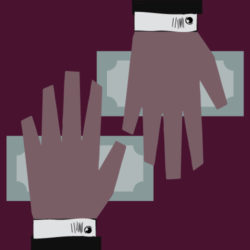The Dalai Lama video is a gift to propagandists
Millions of people around the world have watched in disgust as a globally renowned spiritual leader revealed himself to be…just another creepy old man. The video of the Dalai Lama, the 87-year-old leader of Tibet, kissing a young boy and asking him to “suck his tongue” was filmed in February at an event that brought together around 100 school students in a temple in Dharamshala, in northern India.
I’ll describe it to you so that you don’t have to watch it: One of the students in the audience asked the Dalai Lama if he could hug him. The octogenarian invited the boy to come up to the stage. As the boy leaned in toward the Dalai Lama to pay his respects, the Dalai Lama planted a kiss on the boy’s lips, then put his forehead against the boy’s, stuck his tongue out and said: “Suck my tongue.” The boy moved away while the Dalai Lama giggled and pulled him in for another hug.
The Dalai Lama’s office issued an apology, and media outlets around the world were quick to resurface the 2014 BBC article that explained how sticking your tongue out, while rude in most cultures, is a greeting in Tibet. Lhagyari Namgyal Dolkar, a Tibetan activist and member of the Tibetan parliament in exile, stretched the bounds of credulity to “argue” that the Dalai Lama’s bizarre behavior could not be interpreted through a “vividly westernized” lens.
At a time when the United States has been demanding that China restart talks over Tibetan self-determination with the Dalai Lama, this video is proving to be a gift to Chinese propaganda. The state-funded Global Times almost immediately argued that the video “raises concerns about the Dalai Lama’s private life” and that the only reason we don’t know of other occasions when he must have “asked someone to kiss his tongue publicly” is because of his “carefully crafted” image in the Western media.
“After decades of channeling funds to the Dalai Lama (via the CIA and associated organizations) as part of an ongoing campaign to weaken and destabilize China, will Western liberals finally feel a bit of buyers’ remorse?” asked a Western influencer who runs a pro-China platform called Friends of Socialist China.
But it’s not just Chinese propagandists who seized on the video to promote their political agendas. In the United States, right-wing conspiracy theorists have been pushing a dark fantasy about a pedophilic global elite, mostly comprising Democrats and Hollywood stars. Vladimir Putin echoed some of these themes in his rambling state of the nation speech in February, when he said that in the West “the perversion that is child abuse all the way up to pedophilia, are advertised as the norm.”
Unsurprisingly, on Twitter, if you search for “Dalai Lama,” among the top entries are tweets from accounts with names like “End Wokeness” and close to a million followers that compare Joe Biden to the Dalai Lama and use the video to encourage you to draw the conclusion that Biden, like the Dalai Lama, a celebrity darling, touches children inappropriately.
In Kyiv, A Spring Offensive is in the Air
By: Amanda Coakley
I recently returned from Ukraine following an assignment that took me across the country. At the dawn of spring, it was an interesting time to be there. The pride of having successfully made it through the winter, despite Russia’s targeting of key energy infrastructure was palpable among the people I met. In Kyiv, the spring air had returned the city’s coffee crowd to the pavements, the restaurants were buzzing, and at times it seemed the capital had returned to normal.
But signs of the war were everywhere. The air siren continued to cry intermittently across the city, soliciting nods of indifference from residents unless there was additional evidence of a Russian attack. And talk was always there about the frontline.
Two issues dominated my discussions with sources and friends. The first: Would Bakhmut, a city in eastern Donbas, hold in the face of mounting losses? The second: Theories on how the long-awaited Ukrainian counteroffensive would manifest. On this, everyone had an opinion. It would focus on Melitopol, a colleague told me. The southern city has been under Russian occupation since February 2022 and is a strategic hub. Another source told me earnestly that they believed an amphibious counteroffensive could be on the table. “It might be like D-Day!” they claimed.
This environment of snap analysis points to a serious obstacle when covering the military side of the war in Ukraine — everyone is suddenly an expert. Strategic disinformation is a part of every war and Ukraine is no exception. When a major leak of classified Pentagon documents, which included intelligence on the war in Ukraine, made the headlines earlier this month, a senior Ukrainian official claimed they were inauthentic, had “nothing to do with Ukraine’s real plans” and were based on “fictitious information” spread by the Russians.
The war is stress-testing journalists’ relationships with even the most trusted official sources, as a push-and-pull between protecting the war effort and documenting history plays out. Everyone knows the enemy religiously monitors international and national media, but it is still the reporter’s job to write the first draft of history. While being fed strategic disinformation is one thing, being steered to cover the need of the day is another. For journalists often starved of official information and, at times, military access being told to “stay quiet about any counter-offensives” one minute and being given access to report on ammunition shortages the next throws up the question of how the Ukrainian authorities see the role of journalists in this war.
One example of this is the traffic light system on access to the frontline, which was announced in March. According to the guidelines, reporters would be prohibited from reporting in red zones, require the presence of press officers in yellow zones and work freely in green zones. Reporters without Borders pushed back. “Journalists are denied access to certain areas on a discretionary decision, while one of the major issues since the start of the war has been the dissemination of reliable information obtained thanks to journalists being able to work freely,” they said in a statement.
On the ground there is still confusion around the traffic light system, and it has been removed from some official resources. The relationship reporters have with individual military press officers remains key.
Ukrainians have made a huge effort to keep the war on the international agenda. Overnight desk reporters have become war reporters, covering a war that is threatening their lives and the existence of their country. Combating the relentless tide of Russian disinformation has added to the complexity of this task. But the fog of war hangs heavy in Ukraine.
DON’T MISS:
- This fantastic op-ed by Maria Ressa and Nishant Lalwani that not only explains that “tyranny’s propagandists are winning” but also offers a solution on how to counter them.
- This scoop from RFE/RL about the leaked files that show how China and Russia trade tricks and collaborate on internet censorship.
- And this deeply awkward (and rather amusing) video of Vladimir Putin asking for, waiting for and failing to get a round of applause at a meeting with ambassadors in Moscow. It was so embarrassing that state media had to explain the silence, saying that “at protocol meetings such as this people don’t usually clap at all.” But that’s just not true. You don’t have to understand Russian to read the room.
WRITING TO EVAN GERSHKOVICH
Many thanks to all Disinfo Matters readers who have written to Evan Gershkovich, our Wall Street Journal colleague who is in a Moscow jail, facing up to 20 years in prison on absurd espionage charges. Evan’s friends and colleagues are encouraging people from around the world to write to him in prison. Evan is allowed to receive letters, although only in Russian. But you can email your message to [email protected] and it will be translated, printed out and mailed to the Moscow prison where Evan is spending two months in pre-trial detention.







